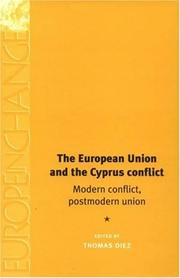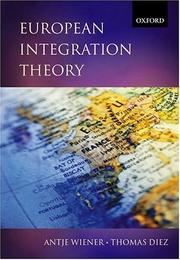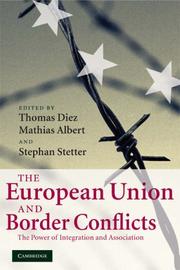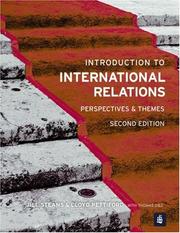| Listing 1 - 10 of 18 | << page >> |
Sort by
|
Book
ISBN: 9781617700903 1617700908 Year: 2014 Publisher: New York, NY : International Debate Education Association,
Abstract | Keywords | Export | Availability | Bookmark
 Loading...
Loading...Choose an application
- Reference Manager
- EndNote
- RefWorks (Direct export to RefWorks)
A Different Kind of Power? brings together the most important contributions to the debate about the past, current and future role of the European Union (EU) in international politics. Its main organizing theme is the question of whether the EU acts as a normative rather than a traditional great power in its external relations. The volume is structured in five sections, which move from outlining the normative power debate to its assessment in different policy areas and in relation to other international actors: Introducing the EU as an International Actor A Different Type of Actor Exploring Policies Situating the EU The Future of EU Foreign Policy.
Security, International --- National security --- Sécurité régionale --- Sécurité nationale --- European Union countries --- Pays de l'Union européenne --- Foreign relations. --- Relations extérieures --- #SBIB:327.7H233 --- Europese Unie: externe relaties, buitenlands- en defensiebeleid (ook WEU) --- Sécurité régionale --- Sécurité nationale --- Pays de l'Union européenne --- Relations extérieures

ISBN: 0719060796 Year: 2002 Publisher: Manchester : Manchester university press,
Abstract | Keywords | Export | Availability | Bookmark
 Loading...
Loading...Choose an application
- Reference Manager
- EndNote
- RefWorks (Direct export to RefWorks)
European Union --- European Union countries --- Cyprus --- Pays de l'Union européenne --- Chypre --- Foreign relations --- History --- Relations extérieures --- Histoire --- European UnionEuropean Union countries --- ChypreForeign relations --- Pays de l'Union européenne --- Relations extérieures
Book
ISBN: 9780719079009 0719079004 Year: 2009 Publisher: Manchester Manchester University Press
Abstract | Keywords | Export | Availability | Bookmark
 Loading...
Loading...Choose an application
- Reference Manager
- EndNote
- RefWorks (Direct export to RefWorks)
Cyprus --- History --- Politics and government --- 956.93 --- -Politics and government --- -Cyprus --- -956.93
Book
ISBN: 9780199226092 0199226091 Year: 2009 Publisher: Oxford: Oxford university press,
Abstract | Keywords | Export | Availability | Bookmark
 Loading...
Loading...Choose an application
- Reference Manager
- EndNote
- RefWorks (Direct export to RefWorks)
International relations. Foreign policy --- European Union --- European federation. --- European Union. --- European Union countries --- Politics and government --- Philosophy. --- European federation --- #SBIB:327.7H201 --- Federation of Europe --- Pan Europa movement --- Paneuropean federation --- United States of Europe (Proposed) --- Federal government --- Regionalism (International organization) --- Europese Unie: politieke theorie --- E.U. --- EU countries --- Euroland --- Europe --- Pays de l'Union européenne --- Economic integration. --- Economic conditions. --- Politics and government. --- Intégration économique --- Conditions économiques --- Politique et gouvernement --- Internationale politiek. Buitenlandse politiek --- Europese Unie

ISBN: 0199252483 9780199252480 Year: 2004 Publisher: [Oxford]: Oxford university press,
Abstract | Keywords | Export | Availability | Bookmark
 Loading...
Loading...Choose an application
- Reference Manager
- EndNote
- RefWorks (Direct export to RefWorks)
European Union countries --- Pays de l'Union européenne --- Economic integration --- Economic conditions --- Politics and government --- Intégration économique --- Conditions économiques --- Politique et gouvernement --- European federation. --- European federation --- Federation of Europe --- Pan Europa movement --- Paneuropean federation --- United States of Europe (Proposed) --- Federal government --- Regionalism (International organization) --- European Union. --- E.U. --- EU countries --- Euroland --- Europe --- Philosophy. --- 341.2422 --- #SBIB:327.7H201 --- Europese Unie: politieke theorie --- International relations. Foreign policy --- European Union --- Philosophy --- Union européenne --- European Union countries - Politics and government - Philosophy --- UNION EUROPEENNE --- THEORIE DE L'INTEGRATION EUROPEENNE --- GENERALITES --- MANUELS
Book
ISBN: 9783319475295 9783319475301 3319475290 3319475304 Year: 2017 Publisher: Cham (Switzerland): Palgrave MacMillan,
Abstract | Keywords | Export | Availability | Bookmark
 Loading...
Loading...Choose an application
- Reference Manager
- EndNote
- RefWorks (Direct export to RefWorks)
This book provides a comprehensive study into the promotion of regional integration as a central pillar of European Union (EU) relations with the rest of the world. It is a strategy to deal with a core security challenge: the transformation of conflicts and, in particular, regional conflicts. Yet to what extent has the promotion of regional integration been successful in transforming conflicts? What can we regard as the core mechanisms of such an impact? This volume offers a comprehensive assessment of the nexus between promoting integration and conflict transformation. The authors systematically compare the consequences of EU involvement in eight conflicts in four world regions within a common framework. In doing so, they focus on the promotion of integration as a preventative strategy to avoid conflicts turning violent and as a long-term strategy to transform violent conflicts by placing them in a broader institutional context. The book will be of use to students and scholars interested in European foreign policy, comparative regionalism, and conflict resolution.
International relations. Foreign policy --- European Union --- Interregionalism. --- Mediation, International. --- European Union countries --- Foreign relations. --- Europe --- Economic integration --- Politics and government --- Regionalism --- Conflict management --- Régionalisme --- Gestion des conflits --- Pays de l'Union européenne --- Economic integration. --- Intégration économique. --- Relations extérieures. --- European Union. --- International organization. --- Comparative politics. --- Regionalism. --- European Union Politics. --- International Organization. --- Comparative Politics. --- Human geography --- Nationalism --- Interregionalism --- Comparative political systems --- Comparative politics --- Government, Comparative --- Political systems, Comparative --- Political science --- Federation, International --- Global governance --- Interdependence of nations --- International administration --- International federation --- Organization, International --- World federation --- World government --- World order --- World organization --- Congresses and conventions --- International relations --- Peace --- International agencies --- International cooperation --- Security, International --- World politics --- Europe - Economic integration --- European Union countries - Politics and government --- Intégration économique --- Relations extérieures --- Régionalisme
Digital
ISBN: 9783319475295 9783319475301 Year: 2017 Publisher: Cham Palgrave Macmillan
Abstract | Keywords | Export | Availability | Bookmark
 Loading...
Loading...Choose an application
- Reference Manager
- EndNote
- RefWorks (Direct export to RefWorks)
This book provides a comprehensive study into the promotion of regional integration as a central pillar of European Union (EU) relations with the rest of the world. It is a strategy to deal with a core security challenge: the transformation of conflicts and, in particular, regional conflicts. Yet to what extent has the promotion of regional integration been successful in transforming conflicts? What can we regard as the core mechanisms of such an impact? This volume offers a comprehensive assessment of the nexus between promoting integration and conflict transformation. The authors systematically compare the consequences of EU involvement in eight conflicts in four world regions within a common framework. In doing so, they focus on the promotion of integration as a preventative strategy to avoid conflicts turning violent and as a long-term strategy to transform violent conflicts by placing them in a broader institutional context. The book will be of use to students and scholars interested in European foreign policy, comparative regionalism, and conflict resolution. .

ISBN: 9780521709491 9780521882965 0521882966 0521709490 9780511491337 9780511395079 0511395078 051139442X 9780511394423 0511491336 9780511392443 110718567X 1281370800 9786611370800 0511393733 0511392443 0511391110 Year: 2008 Publisher: Cambridge : Cambridge University Press,
Abstract | Keywords | Export | Availability | Bookmark
 Loading...
Loading...Choose an application
- Reference Manager
- EndNote
- RefWorks (Direct export to RefWorks)
It is generally assumed that regional integration leads to stability and peace. This book is a systematic study of the impact of European integration on the transformation of border conflicts. It provides a theoretical framework centred on four 'pathways' of impact and applies them to five cases of border conflicts: Cyprus, Ireland, Greece/Turkey, Israel/Palestine and various conflicts on Russia's border with the EU. The contributors suggest that integration and association provide the EU with potentially powerful means to influence border conflicts, but that the EU must constantly re-adjust its policies depending on the dynamics of each conflict. Their findings reveal the conditions upon which the impact of integration rests and challenge the widespread notion that integration is necessarily good for peace. This book will appeal to scholars and students of international relations, European politics, and security studies studying European integration and conflict analysis.
Security, International --- Democracy --- Boundary disputes --- Sécurité régionale --- Démocratie --- Conflits de frontières --- Case Studies --- Cas, Etudes de --- European Union --- Enlargment --- European Union countries --- Pays de l'Union européenne --- Foreign relations --- Economic integration --- Relations extérieures --- Intégration économique --- -327.172094 --- 327.172094 --- #SBIB:327.5H20 --- #SBIB:327.7H233 --- Vredesonderzoek: algemeen --- Europese Unie: externe relaties, buitenlands- en defensiebeleid (ook WEU) --- Europe --- EU countries --- Euroland --- Council of Europe countries --- Eastern Hemisphere --- Eurasia --- Boundaries. --- Political aspects. --- Boundaries --- Political aspects --- Social Sciences --- Political Science --- Security, International - European Union countries --- European Union countries - Boundaries --- Europe - Economic integration - Political aspects

ISBN: 0582894034 9780582894037 Year: 2004 Publisher: Harlow, England : Pearson Education,
Abstract | Keywords | Export | Availability | Bookmark
 Loading...
Loading...Choose an application
- Reference Manager
- EndNote
- RefWorks (Direct export to RefWorks)
Book
ISBN: 9781412928489 9781412928472 1412928486 Year: 2011 Publisher: London: Sage,
Abstract | Keywords | Export | Availability | Bookmark
 Loading...
Loading...Choose an application
- Reference Manager
- EndNote
- RefWorks (Direct export to RefWorks)
International relations --- Philosophy --- International relations.
| Listing 1 - 10 of 18 | << page >> |
Sort by
|

 Search
Search Feedback
Feedback About UniCat
About UniCat  Help
Help News
News